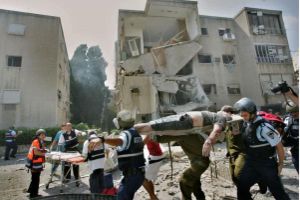
by Robert Scheer
Martin Luther King Jr., shortly before his assassination, grieved that his own nation was “the greatest purveyor of violence in the world today.” He was referring to the U.S. quagmire in Vietnam, but were he alive today, his prophetic voice would no doubt similarly question the bloodbath in Iraq. In response to the 9/11 killing of 3,000 Americans by a gang of mostly Saudi Arabian terrorists with no links to Iraq, the president has rendered that country a veritable killing field. An occupation initially advertised as a “cakewalk” war to disarm a tyrant is now, according to our politically desperate president, a fight for the soul of the world—good versus evil, democracy versus tyranny.
But the carnage we have visited upon Iraq represents nothing of the sort. We are not building democracy, we are creating mayhem.
The evidence arrives daily in the form of dozens, sometimes hundreds, of mutilated bodies. But even the few ghastly images that actually make it onto the television actually underestimate the horror. And it is getting worse, not better: The killing of innocents is now 10 times higher than a year ago.
The most thorough appraisal of Iraqi deaths, done by British and American epidemiologists using accepted norms for public health research and published in the respected medical journal The Lancet, puts the number of war- and occupation-related dead at an appalling 650,000.
The authors, being serious scientists, concede that counting the dead in a country turned into a war zone is a difficult enterprise, but even the lowest figure in their estimate, more than 300,000 dead, is shocking enough.
Perhaps most important, it is not only the derided “cut and run” domestic critics of the president’s policy who recognize that our continued presence is part of the problem rather than of the solution, but 90 percent of the Iraqi people we are supposedly trying to help, according to recent U.S. government and scholarly public-opinion surveys.
Even more shocking: Six in 10 believe it actually is acceptable to target U.S. troops for assassination. And while President Bush on Monday once again reassured the impotent puppet government in Baghdad that the United States is prepared to “stay the course,” the vast majority of both Shiite and Sunnis want us to leave within the next year.
That is not because, as the president insists, they want the outcome of an Al Qaeda-dominated Iraq; on the contrary, all of the polling data shows that Osama bin Laden remains enormously unpopular in Iraq. It is rather that they feel strongly that they could do a better job of providing security on their own, and they are afraid that the destabilizing U.S. presence, the main recruiting poster for terrorists, threatens to be permanent.
This makes the relevance of King’s earlier condemnation of a pigheaded stay-the-course policy in Vietnam all the more relevant. The point is that it is time for the Iraqis, like the Vietnamese, to make their own history. They can hardly make a worse mess of it.
One cannot predict with any certainty the future of Iraq, or the region, in the face of a U.S. military withdrawal, but clearly Bush is wrong in insisting that our continued occupation of Iraq lessens rather than increases the likelihood of future terrorist attacks on the United States. Iraqis, like the Vietnamese, are most of all nationalists, preoccupied with the future of their own country rather than, as the president insists, challenging America’s way of life. We still have not a single example of a disgruntled Iraqi carrying the battle to U.S. soil, but the longer we stay, the greater the likelihood of just such blowback.
Staying the course is a prescription for disaster. That is why a commission backed by Bush and led by the former Secretary of State James Baker, a Republican and a longtime aide to the Bush family, intends to propose—against the repeatedly stated wishes of the president—significant changes in the administration’s strategy by early next year, according to the Los Angeles Times and other papers. “Two options under consideration would represent reversals of U.S. policy: withdrawing American troops in phases, and bringing neighboring Iran and Syria into a joint effort to stop the fighting,” reported the paper. At least one commission participant says they have already decided Bush is dead wrong: “It’s not going to be ‘stay the course,’ ” the participant told the Times. “The bottom line is, [U.S. policy] isn’t working.... There’s got to be another way.”
In other words, Bush’s critics were right all along.
No comments:
Post a Comment